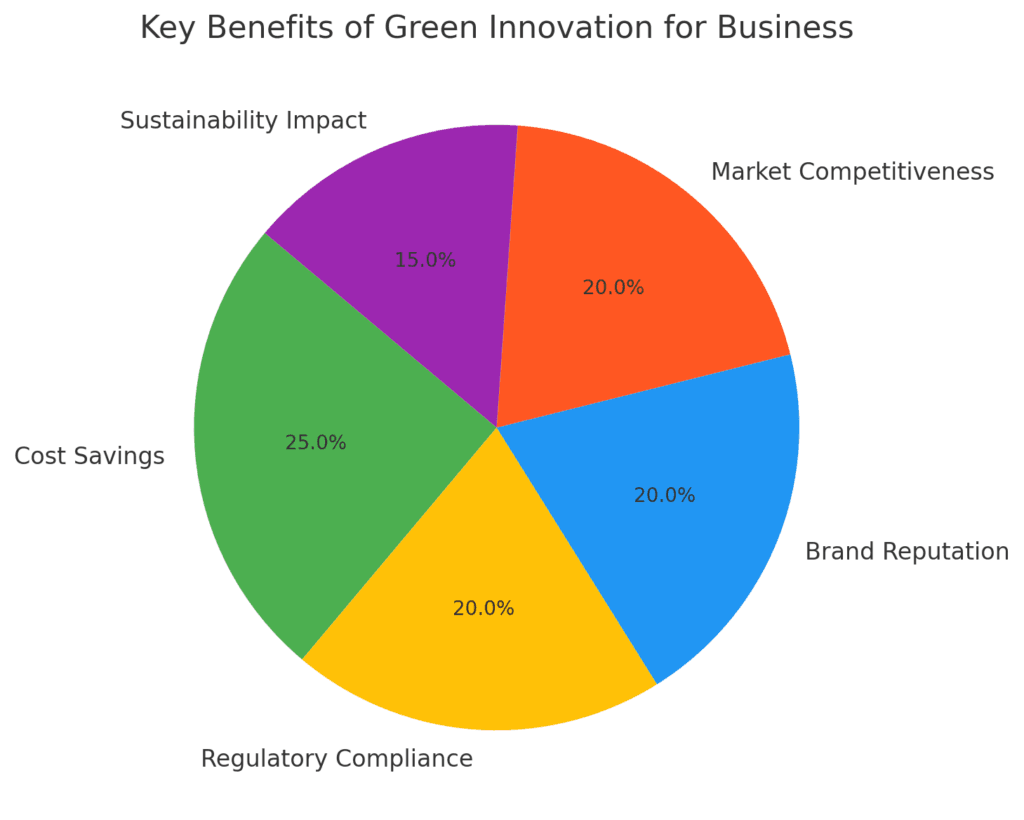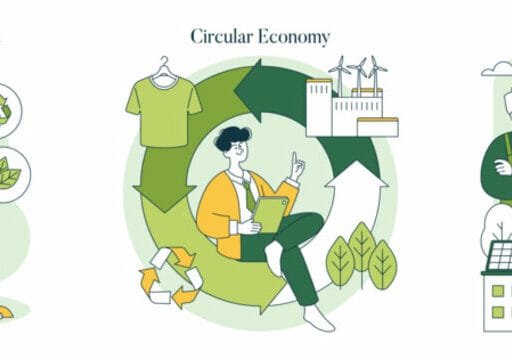Green innovation for business has emerged as a key tactic for organizations looking to sustain growth and keep a competitive advantage in the quickly changing business environment of today. Businesses may generate substantial value by incorporating eco-friendly practices including the use of renewable energy, eco-friendly product creation, and sustainable supply chain management. This essay explores how these green techniques guarantee compliance with ever-increasing environmental requirements while simultaneously lowering operating expenses and drawing in a growing number of eco-conscious customers. It also emphasizes how businesses that make sustainability investments are better positioned to achieve long-term success and future-proof their operations.
“The greatest threat to our planet is the belief that someone else will save it.” – Robert Swan
Embracing Renewable Energy for Sustainable Growth
A key component of Green Innovation for Business is the use of renewable energy sources. In addition to reducing the negative effects on the environment, switching to renewable energy has financial benefits. Businesses may, for example, drastically lower their energy expenses over time by making investments in hydroelectric, solar, or wind power. Adoption of renewable energy can also protect companies from the erratic markets for fossil fuels, resulting in more predictable energy costs. To make renewable energy projects even more financially viable, governments throughout the world are also providing incentives like tax credits and subsidies.
Google’s pledge to run its business fully on renewable energy is a noteworthy example. Google has met its objective of purchasing renewable energy to match its worldwide energy usage by investing in wind and solar projects. In addition to showing environmental responsibility, this saves a significant amount of money and establishes the firm as a pioneer in sustainable operations.
Developing Eco-Friendly Products to Meet Consumer Demand
The creation of environmentally friendly products is now a crucial part of Green Innovation for Business due to the movement in customer preferences towards sustainability. More and more customers are looking for goods that are both environmentally friendly and useful. By developing sustainable products in response to this desire, businesses may stand out from the competition, foster consumer loyalty, and reach new markets.
This strategy is best demonstrated by the outdoor clothing brand Patagonia, which uses recycled materials in their goods and supports fair trade principles. Their customers appreciate their dedication to environmental responsibility, which boosts sales and builds brand recognition. Businesses may balance environmental responsibility and revenue by incorporating sustainability into the design and production of their products.

Green Innovation for Business by Implementing Sustainable Supply Chains
Because it tackles the environmental effects of sourcing, production, and distribution procedures, sustainable supply chain management is essential to Green Innovation for Business. Businesses may cut expenses, increase efficiency, and minimize waste by making supply chains more sustainable. This entails using energy-efficient shipping techniques, limiting packing materials, and choosing suppliers that follow environmental standards.
Through its Sustainable Living Plan, which attempts to separate the company’s expansion from its environmental impact, Unilever has achieved notable progress in this area. Through tight collaboration with suppliers to advance sustainable agriculture and lower greenhouse gas emissions throughout its supply chain, Unilever has reduced costs and improved its brand. In addition to helping the environment, putting such sustainable ideas into practice also improves stakeholder relations and increases overall business resilience.
Comparison Table: Traditional vs. Green Innovation for Business
| Aspect | Traditional Business Approach | Green Innovation for Business |
|---|---|---|
| Energy Consumption | Reliant on fossil fuels, high costs | Uses renewable energy, cost-efficient |
| Product Development | Mass production, high waste | Eco-friendly, sustainable materials |
| Supply Chain | Linear, high emissions | Circular, reduced carbon footprint |
| Customer Engagement | Product-focused marketing | Sustainability-driven branding |
| Regulatory Compliance | Meets minimum legal requirements | Proactively exceeds sustainability laws |
| Long-term Viability | Vulnerable to market shifts | Future-proofed against economic changes |
Cost Reduction through Green Innovation for Business
One important component of Green Innovation for Business is the significant cost savings that may result from incorporating green practices into daily operations. Lower operating costs are a result of resource optimization, waste reduction programs, and energy efficiency measures. Utility expenditures may be considerably reduced, for instance, by renovating buildings with energy-efficient lighting and equipment. Furthermore, trash minimization initiatives save disposal expenses and, via recycling initiatives, may even result in financial gains.
One billion metric tons of greenhouse gasses are to be removed from Walmart’s worldwide value chain by 2030 as part of Project Gigaton. Walmart not only supports environmental sustainability but also achieves financial savings that boost its bottom line by working with suppliers to increase energy efficiency and decrease waste. These instances show how green projects may benefit the environment and the bottom line.
Attracting Customers through Sustainable Practices
Sustainability is a potent weapon for attracting customers in Green Innovation for Business as consumers are increasingly basing their purchases on a company’s environmental policies. Companies may stand out in the marketplace and forge closer bonds with their clients by showcasing a dedication to sustainability. Consumers that care about the environment respond favorably to open communication about sustainability initiatives, such as carbon footprint reduction or eco-friendly packaging, and this can boost brand loyalty.
By creating electric cars that appeal to buyers looking for eco-friendly transportation choices, Tesla has profited from this trend. In addition to drawing in a devoted clientele, their emphasis on sustainability has established the business as a pioneer in the automobile sector. Businesses may improve their market position and spur development by coordinating their operations with customer values.
Navigating Regulatory Compliance through Green Innovation
Globally, environmental standards are getting stricter, and corporate continuation depends on compliance. Proactively implementing procedures that not only satisfy but also beyond legal criteria is known as “green innovation for business.” By taking a proactive stance, non-compliance-related penalties, legal problems, and reputational harm can be avoided. Furthermore, as markets increasingly prefer environmentally conscious businesses, staying ahead of rules can provide you a competitive edge.
For example, in response to criticism from activist fund managers, Coca-Cola has promised to reveal its investments in reusable bottles and monitor the results of these initiatives. The company’s dedication to sustainability and openness aids in navigating regulatory environments and satisfying investor demands. Businesses may guarantee compliance and foster stakeholder trust by incorporating green innovation into their operations.
Future-Proofing Operations with Green Innovation for Business
Investing in sustainability is a way to future-proof businesses, not merely to solve present environmental issues. Businesses may adjust to changing market conditions, resource shortages, and climate-related hazards by implementing green innovation. Businesses may assure long-term profitability, foster innovation, and improve resilience by integrating sustainability into their basic strategy.
Neste, a pioneer in renewable energy worldwide, has changed its business strategy to concentrate on making sustainable aviation fuel and renewable diesel. In addition to addressing environmental issues, this strategy change positions the business as a leader in the green economy and creates new income sources.









